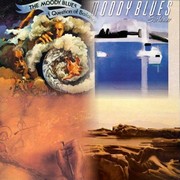WARNING!!
These reviews are given in the spirit of a personal editorial and of personal opinion. If you would find yourself offended by these views and criticisms within the body of these reviews, please do not read further. It is not our intention to offend or injure someone's views on their favourite band. We wrote these as one-time fans who now, after many years, revisited these albums and wanted to write fair and unbiased reviews of The Moody Blues' material. If indeed, a member of The Moody Blues does happen to read these reviews, please take into consideration that these are simply opinions. These reviews present an alternate perspective.
Thank You,
Shawn and Andrew Dow,
March, 2007

